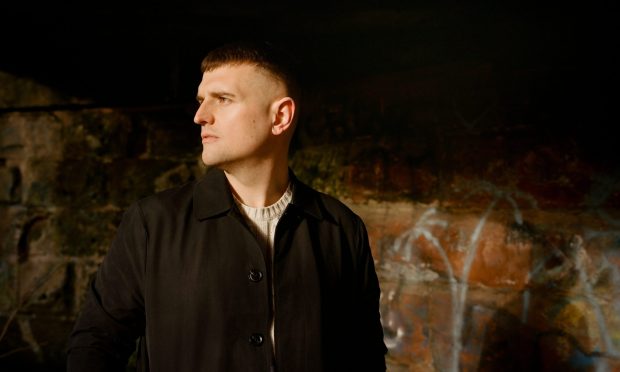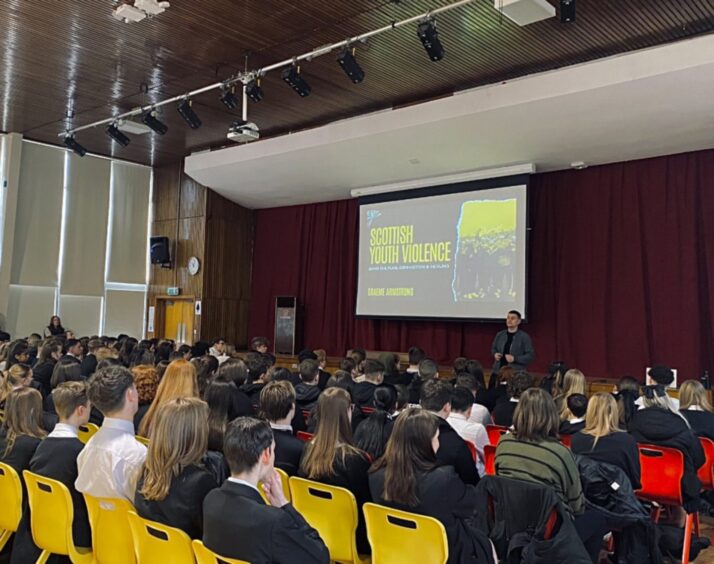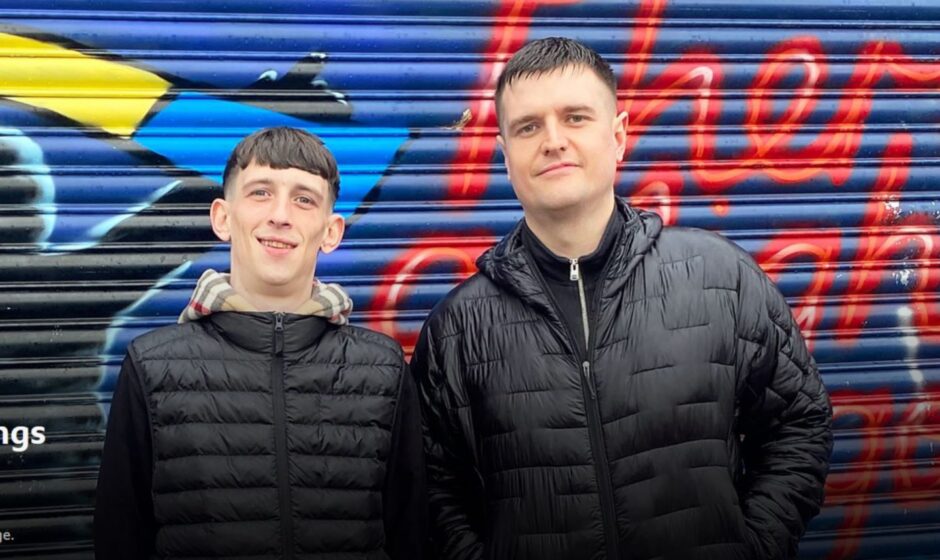
When Graeme Armstrong stepped back into Airdrie Academy last week, it represented a full-circle moment for him.
He was expelled from the Lanarkshire school for fighting during his third year, yet when he returned on Monday it was to speak to pupils about anti-violence. He did so as a bestselling and award-winning novelist.
Graeme wrote the acclaimed The Young Team – about a teenager called Azzy who submits to gang culture – after his own experiences of youth gangs led him to spiral into a world of violence and substance abuse while growing up in Airdrie.
The book’s success has led Graeme to become a highly sought-after anti-violence campaigner and speaker – already in 2024 he has visited 46 schools around the country, following on from the 51 he addressed last year.
Graeme Armstrong’s return to his old school
“It was emotional,” he said about visiting his old school. “I was permanently expelled for fighting and so to be back 18 years later and doing anti-violence inputs does feel full circle.
“The headteacher said, ‘If I could unexpel you, I would’, which was such a nice sentiment. I wasn’t an angel and it was right I was punished at times. But the culture in schools has really transformed, where they are moving away from exclusion as a knee-jerk reaction all the time, like it was when I was there.
“I don’t think some of the pupils realised I was a former pupil and you could see the pride when they realised I was one of them. It’s their world, and the world is quite small when you’re a teenager.
“It’s the old saying, you can’t be what you can’t see. I took the wrong road for many years but I found my way back and it gives me a sort of solace looking back at a youth wasted, that you can use it as a tool to transform and save lives. If you can stop one kid from putting a Valium tablet in their mouth or a knife in their pocket then you might well have saved a life, but you’ll never know.”
Graeme, who also made a well-received BBC Scotland documentary series called Street Gangs, said he never imagined his book would be used in schools. “For the obvious reasons – the content and language,” he continued, so it’s with pride he mentions that it could soon be part of the official reading list.
“The Young Team is on the SQA survey to be considered as an official Scots text, so there could be the option of it being done in every secondary school in Scotland.”
He has talked in schools all over the country, in affluent areas, deprived areas and those in between. It’s a worry, he says, just how in-demand he has become.
“I didn’t realise how close it is to many of those kids’ realities; there’s a real resonance,” he said.
“When you speak to people, they ask me if I ever see an Azzy or a Graeme Armstrong in front of me at the schools and I say take your pick.
“You can tell the ones with the street fashion and bravado, making choices every Friday and Saturday night that will have serious consequences. People are being killed again in Scotland, which we’ve not seen in a long time. A lot of my speaking started in the adult prison system, working with the tutors in Barlinnie, where they used the book for literacy. I had some really meaningful interactions with the guys in there.”
Scottish Masculinities
Graeme, who works alongside organisations such as the Scottish Violence Reduction Unit, Medics Against Violence and the Hope Collective – the charity set up by Damilola Taylor’s father Richard, is part of this month’s Paisley Book Festival.
He is on the panel for a discussion called Scottish Masculinities, alongside fellow authors Alan Bissett and Brian Conaghan, both of whom have also written books that focus on the pitfalls and challenges of growing up male in Scotland today.
“It’s different perspectives of the same issue,” Graeme said. “Brian has written a young adult book about gang culture in Coatbridge. Alan’s is looking at misogyny and big issues facing young guys now that maybe weren’t at the forefront when we were young; the nefarious influence of people like Andrew Tate and attitudes we would never have had in a matriarchal working-class society.
“Art is a great leveller – we can all appreciate art as humans. It gives people a thought and you can back it up with academia and facts, which is what I do in schools. It’s not just the cumulative experience.”
Alongside his schools programme, Graeme remains hugely busy on other projects. He has just completed his second novel, Raveheart, which he describes as cultural comedy, and he is also working on a TV adaptation of The Young Team.
“They’ve asked me to have a pop at the script to see if I can bring something to it, so I’m cutting my teeth on that,” he added. “I’m also working on book three – the memoir – for my PhD. The memoir is a sincere portrait of that life and it’s a difficult story to tell.”
Scottish Masculinities, Paisley Book Festival, Paisley Town Hall, April 28

Enjoy the convenience of having The Sunday Post delivered as a digital ePaper straight to your smartphone, tablet or computer.
Subscribe for only £5.49 a month and enjoy all the benefits of the printed paper as a digital replica.
Subscribe
 © BBC
© BBC